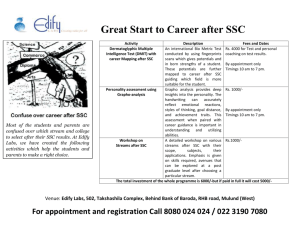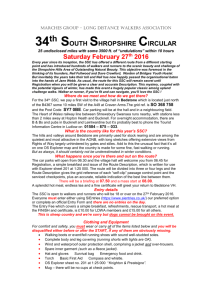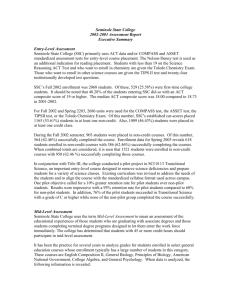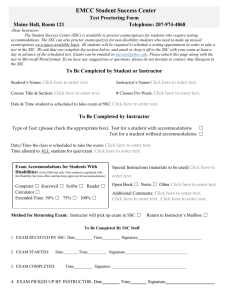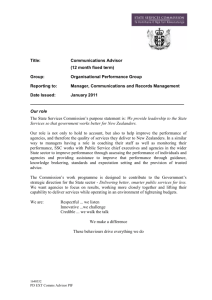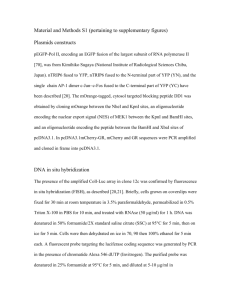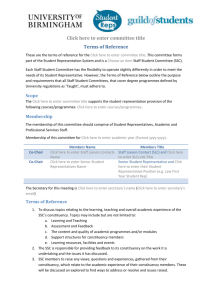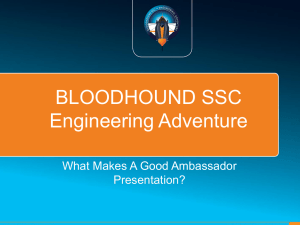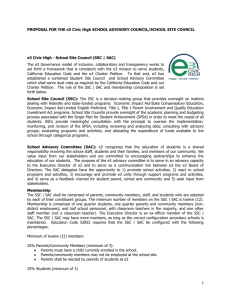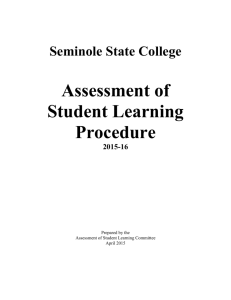Executive Summary - Seminole State College
advertisement
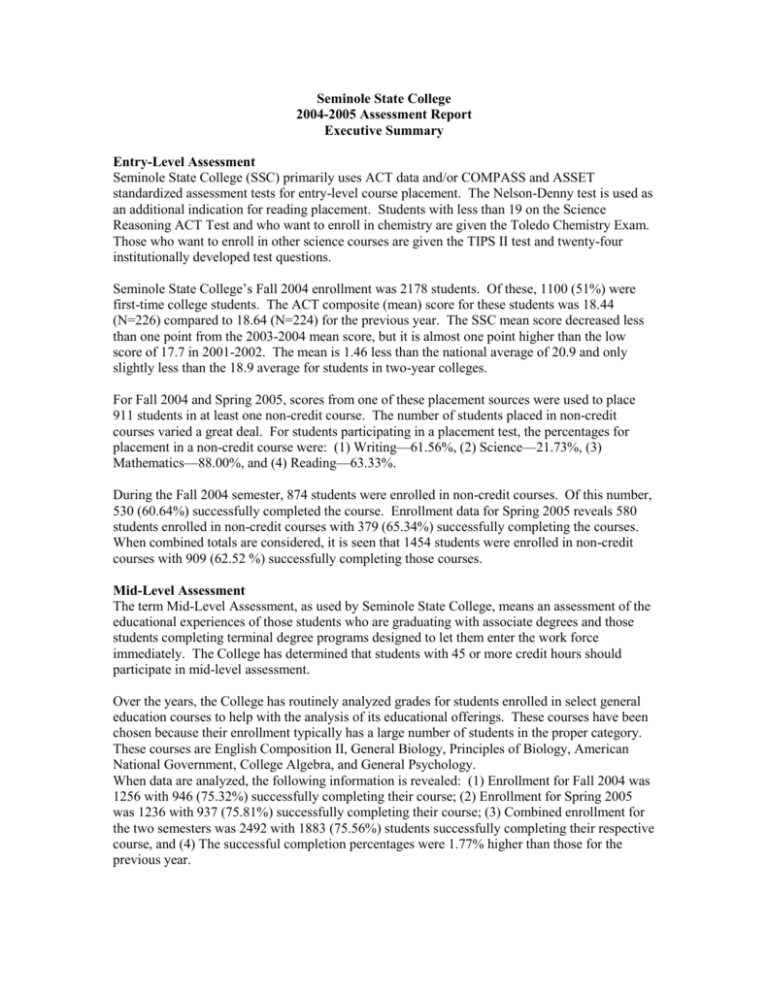
Seminole State College 2004-2005 Assessment Report Executive Summary Entry-Level Assessment Seminole State College (SSC) primarily uses ACT data and/or COMPASS and ASSET standardized assessment tests for entry-level course placement. The Nelson-Denny test is used as an additional indication for reading placement. Students with less than 19 on the Science Reasoning ACT Test and who want to enroll in chemistry are given the Toledo Chemistry Exam. Those who want to enroll in other science courses are given the TIPS II test and twenty-four institutionally developed test questions. Seminole State College’s Fall 2004 enrollment was 2178 students. Of these, 1100 (51%) were first-time college students. The ACT composite (mean) score for these students was 18.44 (N=226) compared to 18.64 (N=224) for the previous year. The SSC mean score decreased less than one point from the 2003-2004 mean score, but it is almost one point higher than the low score of 17.7 in 2001-2002. The mean is 1.46 less than the national average of 20.9 and only slightly less than the 18.9 average for students in two-year colleges. For Fall 2004 and Spring 2005, scores from one of these placement sources were used to place 911 students in at least one non-credit course. The number of students placed in non-credit courses varied a great deal. For students participating in a placement test, the percentages for placement in a non-credit course were: (1) Writing—61.56%, (2) Science—21.73%, (3) Mathematics—88.00%, and (4) Reading—63.33%. During the Fall 2004 semester, 874 students were enrolled in non-credit courses. Of this number, 530 (60.64%) successfully completed the course. Enrollment data for Spring 2005 reveals 580 students enrolled in non-credit courses with 379 (65.34%) successfully completing the courses. When combined totals are considered, it is seen that 1454 students were enrolled in non-credit courses with 909 (62.52 %) successfully completing those courses. Mid-Level Assessment The term Mid-Level Assessment, as used by Seminole State College, means an assessment of the educational experiences of those students who are graduating with associate degrees and those students completing terminal degree programs designed to let them enter the work force immediately. The College has determined that students with 45 or more credit hours should participate in mid-level assessment. Over the years, the College has routinely analyzed grades for students enrolled in select general education courses to help with the analysis of its educational offerings. These courses have been chosen because their enrollment typically has a large number of students in the proper category. These courses are English Composition II, General Biology, Principles of Biology, American National Government, College Algebra, and General Psychology. When data are analyzed, the following information is revealed: (1) Enrollment for Fall 2004 was 1256 with 946 (75.32%) successfully completing their course; (2) Enrollment for Spring 2005 was 1236 with 937 (75.81%) successfully completing their course; (3) Combined enrollment for the two semesters was 2492 with 1883 (75.56%) students successfully completing their respective course, and (4) The successful completion percentages were 1.77% higher than those for the previous year. Executive Summary—SSC 2004-2005 Assessment Report In addition to grades in these courses, SSC pilot-tested the Educational Testing Service’s Academic Profile in 2002 with limited information. However, since that time, it has conducted the test annually. The February 2003 test was conducted with 263 students and its results gave much better information. Then, in October 2004 the test was administered to 131 students with 97 in the category of interest. While the number of students tested in 2004 was half of the number in 2003, the percentage of students with 45 or more credit hours increased from 52.47% to 74.05%. This is due to a more thorough process used for determining classes with high enrollments in this category and provides more useful information. The test was administered again in November 2005, but the results will not be available until the end of the year. However, results from the 2003 and 2004 tests confirm what other assessment tools have previously indicated—Seminole State College is fulfilling its academic mission. Some additional components used in meeting the objectives of this area are the annual SSC Graduate Opinion Survey, the biennial SSC Student Opinion Survey, and reports from receiving institutions. As has been the case for several years, data from these documents suggest that students and employers are pleased with the educational experiences at SSC. In fact, the 20032004 SSC Graduate Opinion Survey revealed that 90.00% rated their experience at SSC as Excellent or Above Average. Program Outcomes Assessment Seminole State College offers Associate in Applied Science Degrees in Business/Information Systems, Medical Laboratory Technology, and Nursing. Faculties in these areas are diligent to collect data that will help them provide the appropriate training for these degrees. They not only survey their students, but also take advantage of several outside agencies for guidance in this regard. Other components used to evaluate program outcomes are the OSRHE Technical Program Review, the SSC Survey of Employers, the Comprehensive Program Review, the Mosby AssessTest, National Certification and Licensure Examinations, National and State Professional Accreditation, and Reports from Receiving Institutions. Areas and the number of graduates are as follows: Business/Information Systems (87), MLT (12), and Nursing (20). Six of the MLT graduates have taken and passed the Board of Registry Exam. All 12 of the graduates are currently employed. In addition, of the 20 Nursing graduates, 18 passed the national licensing exam and are employed. Student Satisfaction Assessment Primary tools used in this area of assessment consist of the annual Student Feedback on Classroom Instruction Form, the biennial SSC Student Opinion Survey, and the annual SSC Graduate Opinion Survey. However, the College also uses other nationally recognized tools such as the ACT Faces of the Future Survey when possible. This survey was administered during the 2003-2004 academic year, and since results were consistent with previous SSC Student Opinion Survey results, it was used again in November 2005. While results of the November 2005 Faces of the Future Survey will not be available until the end of the year, nearly 85% of the students who participated in the 2003-2004 indicated their level of satisfaction with SSC was either Very Satisfied or Satisfied. The annual Seminole State College Graduate Opinion Survey is also an important part of the assessment process. The latest report is for the academic year 2003-2004 in which 301 surveys were mailed to recent graduates. Fifty graduates returned completed surveys giving a return rate of 16.61%, the lowest in several years. Concerned about this low rate, the Assessment of Student Learning Committee analyzed the situation and determined the rates were decreasing from year to ii Executive Summary—SSC 2004-2005 Assessment Report year and had fallen from nearly 40% to about 16%. It was suggested that many recent graduates do not respond well to mailed surveys, but might to electronic ones. Therefore, it authorized an online survey to be used for the 2004-2005 survey. This survey has been developed and is currently open to the 2004-2005 graduates. A report of the results will be presented in detail in the next annual assessment report. Asked for their overall academic rating of SSC, 90.00% gave a rating of Excellent or Above Average. When asked about their overall experience at SSC, 90.00% of the respondents gave a rating Excellent or Above Average. And finally, when asked if they would start at SSC again, 91.83% indicated that they would. These results are consistent with past survey results. As in past surveys, graduates indicate factors such as location and cost influenced their decision to attend SSC, but once enrolled, they indicate a great deal of satisfaction with the quality of instruction and services provided by the College and would recommend it their friends. In addition, the concern shown by faculty and staff continues to be one of the most important aspects of the SSC educational experience. Thus, it appears that SSC is providing the type of educational experience most students want and expect. iii
